Seeding the Future of African American Poetry
Many poets, scholars, and literary historians believe that there is currently a renaissance of African American poetry, which the poet Haki Madhubuti has called “a third renaissance” and poet Elizabeth Alexander has called a “golden age.” The last fifty years have witnessed a “furious flowering,” as Joanne Gabbin chooses to call it, of African American poetry. The poets writing during this period have challenged the status quo and raised their voices in the struggle against racism, sexism, political and economic exploitation, violence and injustice. They have created lyrical beauty, while experimenting with language and form. They have explored and exposed private and public concerns through the use of personae and portraits of unashamed truth while building on the work of earlier generations. As the Furious Flower Poetry Center continues to do today, the 1994 conference helped to seed this future by welcoming young Black poets and intellectuals into the fold. Below are just a few of the people who participated in the 1994 conference long before their careers blossomed into full flower.
Dark Room Collective
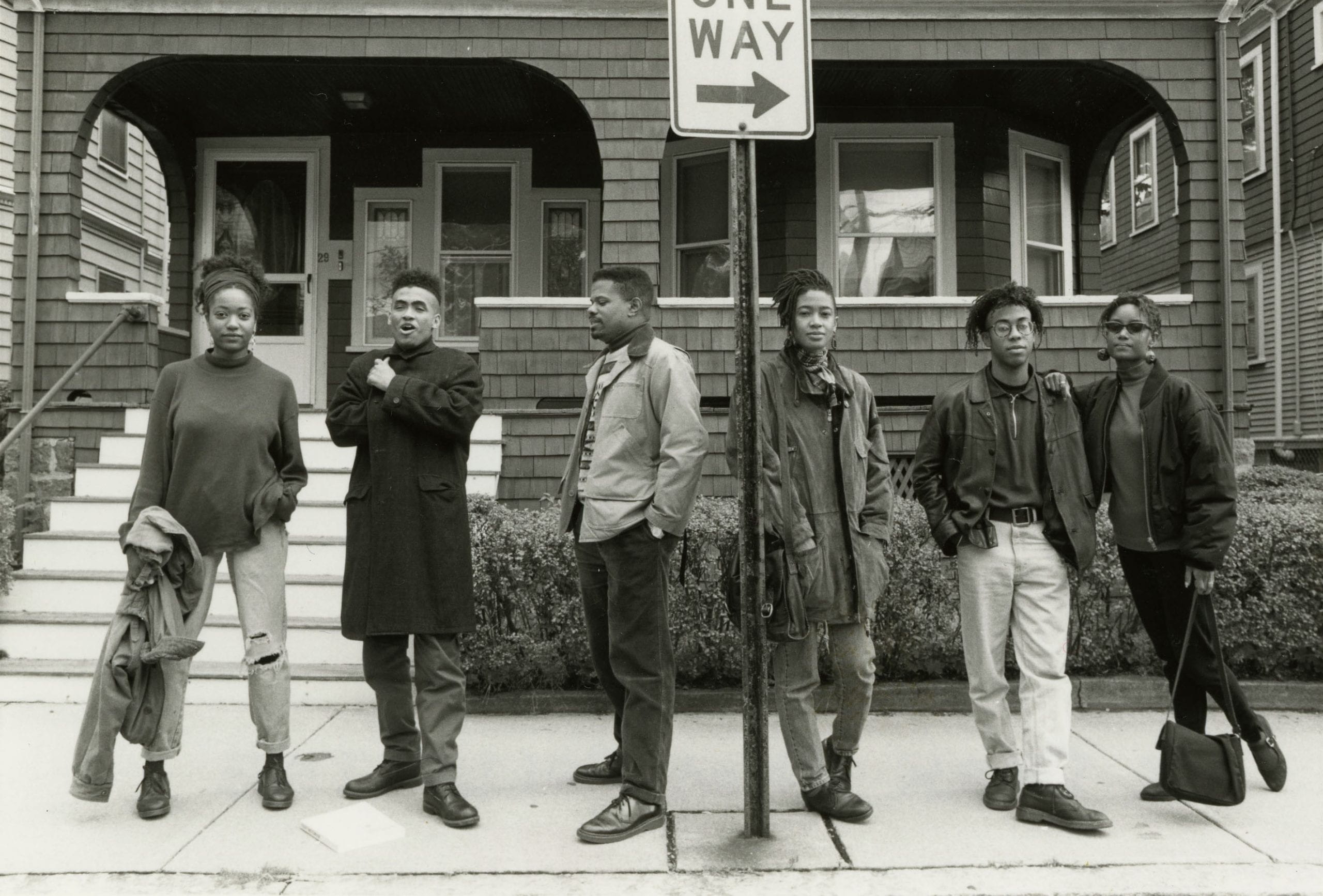
Photo: Furious Flower Conference Program, 1994
The Dark Room Collective (DRC) was founded in 1988 by Thomas Sayers Ellis and Sharan Strange, who were inspired after they went to James Baldwin’s funeral in 1987 as Harvard undergraduates. The mission for the group was to form a community of established and emerging African American writers. At the 1994 Furious Flower Conference, Vera Beatty, Thomas Sayers Ellis, Major Jackson, John Keene, Sharan Strange, Natasha Trethewey, and Kevin Young performed as the Dark Room Collective, but members also included Nehassaiu deGannes, Janice Lowe, Carl Phillips, Tracy K. Smith, and Artress Bethany White. Phillips and deGannes attended the 1994 Conference, but they did not perform with the DRC. Strange and Young began hosting readings at their Victorian house in Cambridge. In the home, large groups would gather in the living room, where they held many poetry readings, including those by Elizabeth Alexander, Cornelius Eady, Yusef Komunyakaa, and later Derek Walcott and Alice Walker. The reading series soon expanded to include musical performances, art shows, and workshops. When crowds became too large for the living room in Cambridge, the DRC moved to the Institute of Contemporary Art in Boston and later the Boston Playwrights Theatre at Boston University. The DRC’s final performances were “drive-by readings,” where they traveled the country to inspire young readers and writers. The group finally disbanded in 1998, ten years after it began.
Kwame Alexander

Photo: Furious Flower Conference Recordings, 1994
Kwame Alexander is a poet and New York Times bestselling author who currently lives in Reston, Virginia and attended Virginia Tech. He performed as part of the Impromptu Poetry Slam for Younger Poets at the 1994 conference. Since then, he has written over 32 books including Swing (2018), Rebound (2018), The Undefeated(2019), illustrated by Kadir Nelson, How to Read a Book (2019), illustrated by Melissa Sweet, and, his Newbery medal-winning middle grade novel, The Crossover (2015). Kwame Alexander has received The Coretta Scott King Author Honor, three NAACP Image Award Nominations, and the 2017 Inaugural Pat Conroy Legacy Award. He also is a regular contributor on NPR’s Morning Edition. Kwame Alexander is also an educator, creating initiatives like #AllBooksForAllKids in partnership with Follett Book Fairs, co-founding LEAP for Ghana, and opening the Barbara E. Alexander Memorial Library and Health Clinic in Ghana. Kwame Alexander also serves as founding editor of Versify.
Ta-Nehisi Coates
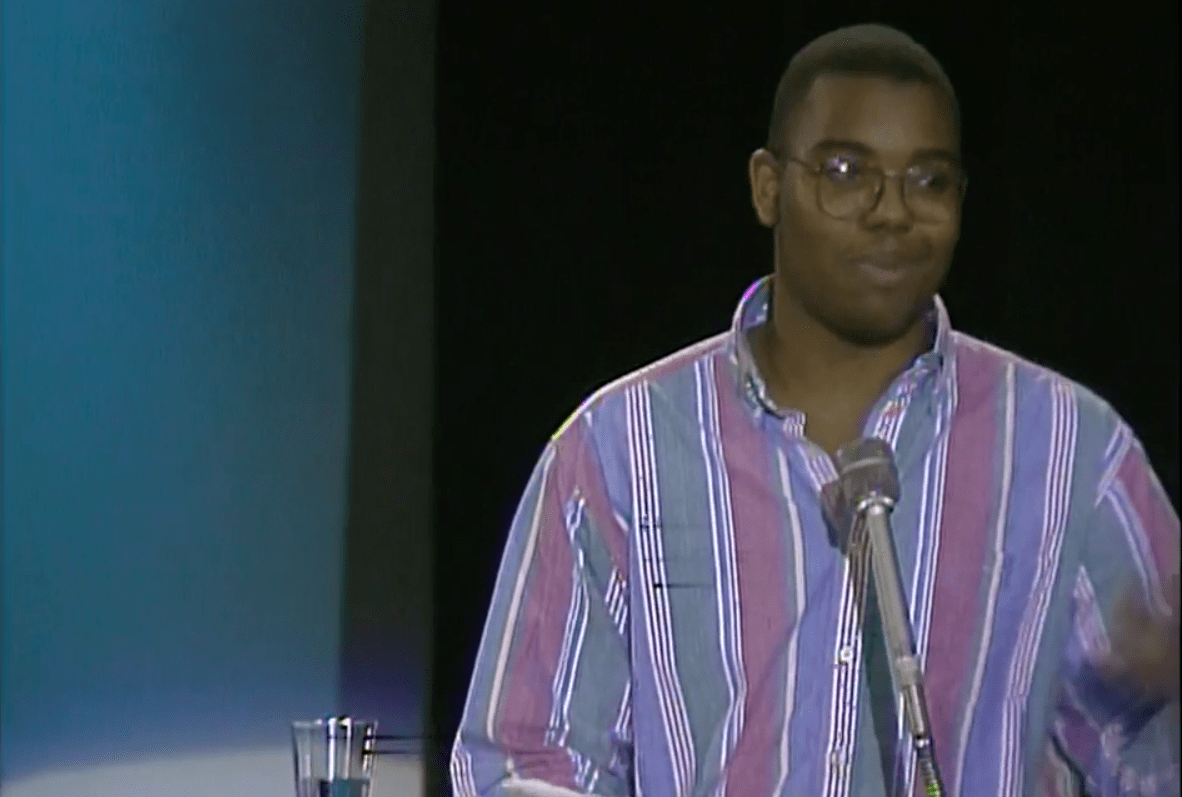
Photo: Furious Flower Conference Recordings, 1994
Ta-Nehisi Coates was born September 30, 1975 in Baltimore, Maryland and attended Howard University in D.C. While a student at Howard, he attended the 1994 conference and participated in the Impromptu Poetry Reading for Younger Poets. His father was a Black Panther, which influenced his future writings. Coates has written 3 influential books: The Beautiful Struggle (2008), Between the World and Me (2015), which won the National Book Award that year, and We Were Eight Years in Power (2017). He is the writer of Marvel Comics’ Black Panther series, has contributed to The New York Times Magazine, The Washington Post, The Washington Monthly, O, and was senior editor at The Atlantic. He currently works at New York University’s Arthur L. Carter Journalism Institute as Distinguished Writer in Residence. Coates list of awards include the 2014 George Polk Award for Commentary and 2015 MacArthur Fellows Program.
Nehassaiu deGannes
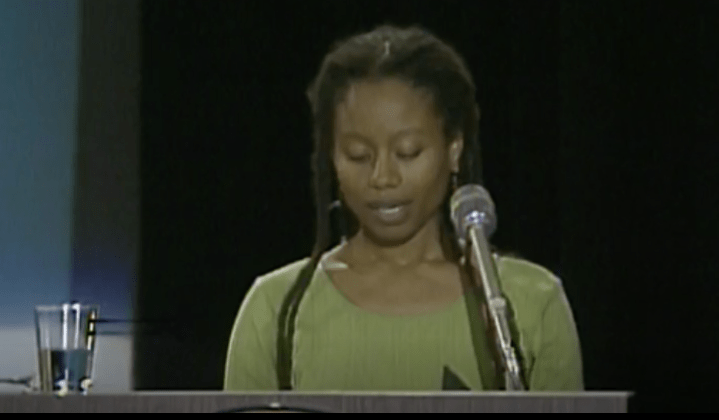
Photo: Furious Flower Conference Recordings, 1994
Dark Room Collective member, poet, playwright, and actor, Nehassaiu deGannes also participated in the Impromptu Poetry Reading for Younger Poets at the 1994 conference. She earned an MA at Temple University, and has authored two chapbooks, Percussion, Salt & Honey (2001), which won the Philbrick Poetry Award for New England Poets, and Undressing the River (2011), winner of the Center for Book Arts Poetry Chapbook Competition. Her poetry incorporates received forms, sensory detail, and the practice of storytelling to explore themes of memory, power, and cultural identity. Her poetry is featured in the literary journals American Poetry Review, Callaloo and Painted Bride Quarterly and the anthology After Shocks: The Poetry of Recovery for Life-Shattering Events (2008). Additionally, deGannes has appeared in many New York City theater productions and has produced her own solo work as well, such as Door of No Return (2012), performed at Brown University.
Joel Dias-Porter
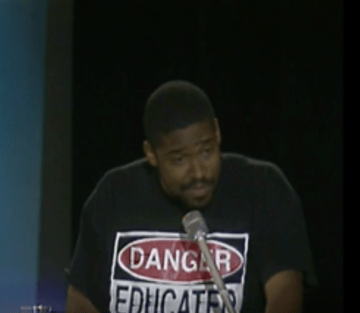
Photo: Furious Flower Conference Recordings, 1994
Joel Dias-Porter was born in Pittsburgh, PA. He gained the title “DJ Renegade” after working as a DJ in the Washington, D.C. area for several years. In 1994, he attended the Furious Flower Poetry Conference and participated in the Impromptu Poetry Slam for Younger Poets. His musical background greatly influences his poetry and is often illustrated through improvisation and lyrical renditions. Some of Porter’s works include the anthology The Black Rooster Social Inn (1997) and his jazz CD LibationSong (2002). He has been featured on the Today Show, in documentaries like Voices Against Violence and SlamNation, and in films like Slam. Some of his accolades include the Furious Flower Emerging Poet Award, 1998 haiku-coopetition award winner, and a frequent National Poetry Slam finalist. Porter currently resides in Washington, D.C. and teaches at Duke Ellington School of the Performing Arts.
Carmen Gillespie
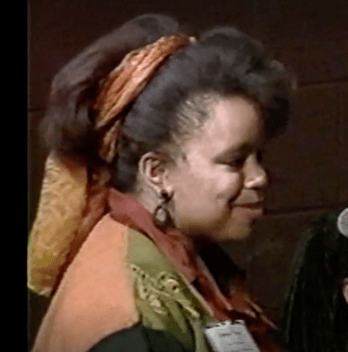
Photo: Furious Flower Conference Recordings, 1994
Carmen Gillespie is a poet, writer, and professor. A former student of Joanne Gabbin’s, she received her Ph.D. from Emory University and coordinated the Impromptu Poetry Slam for Younger Poets at the 1994 conference. She is currently a professor of English at Bucknell University, as well as the founder and director of the Griot Institute for Africana Studies at Bucknell University. She is a Cave Canem Fellow as well as a Fulbright scholar and has received an Ohio Arts Council Individual Artist Fellowship for Excellence in Poetry. She also was named one of Essence magazine’s 40 favorite poets as part of the commemoration for the magazine’s 40th anniversary. She is known for works such as A Critical Companion to Toni Morrison (2007) and A Critical Companion to Alice Walker (2011), along with a poetry chapbook Lining the Rails (2008) and two poetry collections, Jonestown: A Vexation (2011) and Black Wet of Wood (2016). Carmen Gillespie is also the editor of Toni Morrison: Forty Years in the Clearing (2012).
Monifa Love
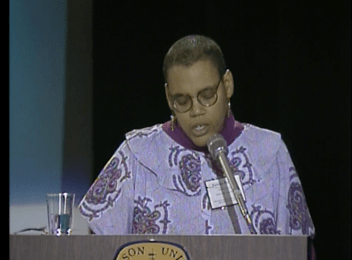
Photo: Furious Flower Conference Recordings, 1994
Monifa Love is an award-winning writer and product of the Black Arts Movement. She’s authored numerous books including two poetry collections, Provisions (1989) and Dreaming Underground (2003), which won the Naomi Long Madgett Award; she has also published an award-winning novel Freedom in the Dismal (1998) and multiple essays on African American visual artists, writers, and musicians. She led the curation of a traveling exhibit entitled “My Magic Pours Secret Libations” and produced the accompanying video which was broadcasted on public television stations. She also founded HomeBase Women, a women’s poetry chorus. At the 1994 conference, she took part in the Impromptu Poetry Slam for Younger Poets. Currently she is the Creative Writing Coordinator and English MA Coordinator at Bowie State University in Maryland.
Carl Phillips

Photo: Furious Flower Conference Recordings, 1994
Carl Phillips was born in Everett, Washington in 1959. He studied Greek and Latin at Harvard University, and his poetry often utilizes classical forms and makes allusions to classical music and literature. In interviews, he emphasizes the multiple interpretations that a work of poetry can have, and speaks of how his experiences as a gay biracial man are tied into his poetry. At the 1994 Furious Flower Conference, he participated in one of the concurrent sessions of academic papers, and also moderated the Thursday evening poetry reading. Since then, he has published numerous volumes of poetry, and he has won the Academy of American Poets Fellowship, an Award in Literature from the American Academy of Arts and Letters, the Academy of American Poets Prize, and a Pushcart Prize. He has also been inducted into the American Academy of Arts and Sciences. Phillips is currently a Professor of English at Washington University in St. Louis.
Mona Lisa Saloy

Photo: Furious Flower Conference Recordings, 1994
Award-winning poet, Mona Lisa Saloy, is a renowned writer of contemporary Creole culture in Black New Orleans before and after Katrina, as well as a folklorist. Saloy documents sidewalk songs, jump-rope rhymes, and clap-hand games to discuss the importance of play. As a poet, her first book, Red Beans & Ricely Yours (2005), won the T.S. Eliot Prize and the PEN/Oakland Josephine Miles Award and tied for a third award. She’s written on the significance of the Black Beat poets, the African American Toasting Tradition, Black & Creole talk, conditions of New Orleans and keeping Creole after the devastation of Hurricane Katrina. Her new book, Second Line Home (2014), is a refreshing collection of poems that captures the day-to-day New Orleans speech, contemplates family dynamics, and celebrates New Orleans—and all in a way everyday people can enjoy. At the 1994 conference, Saloy was featured on the program as part of the Saturday afternoon poetry reading. Currently, she is Coordinator and Professor of the English Department at Dillard University and has been for over 27 years.
Related Links